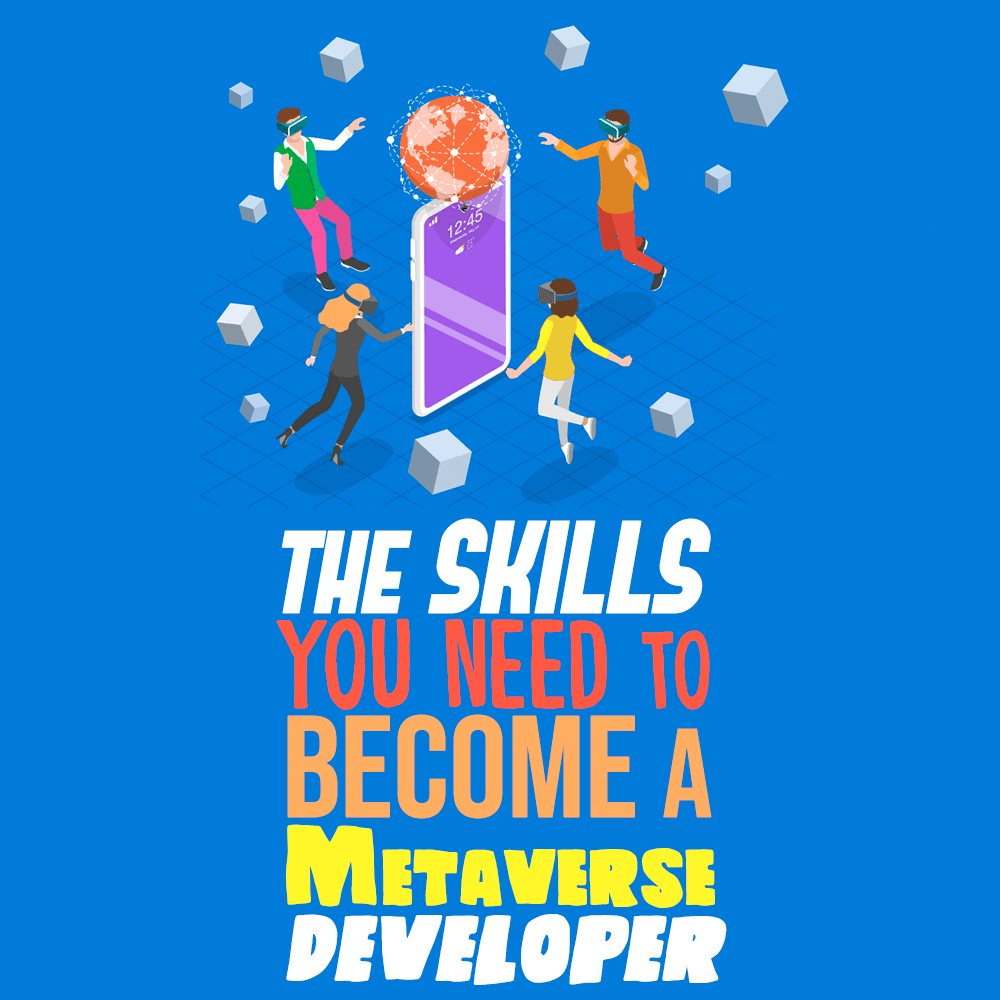
Though it’s difficult to predict how exactly this space will evolve and scale, it’s safe to say that developers have to learn new skills, relearn old skills, and focus on critical thinking and problem-solving. While you’ll need to learn new skills as new technologies emerge, it’s also important to brush up on old ones; some of these will be needed in the metaverse.
Whatever the metaverse promises to be today will probably only be a part of it in the future. Like in the early days of the internet, we haven’t even started imagining the extensive possibilities that come with web3.
What Is the Metaverse?
The term “metaverse” was coined by the author Neil Stevenson three decades ago in his science fiction novel Snow Crash. The story is about a future when people run away from their hopeless reality into colorful virtual realities in a computer-generated universe. He called this imaginary world the metaverse.
While the concept of virtual reality is nothing new, the metaverse takes it a step further: You’re not just viewing what’s on the internet, you’re in it. There are technologies available now that are a step into the metaverse, but no dominant platforms.
According to Victor Dornescu, co-founder and chief innovation officer at rinf.tech, “to bring the metaverse to life, we have to leverage a combination of technologies.” However, technology alone isn’t enough. Dornescu also said that “a shift in engineering culture and mindset is needed.”
As we race toward a new digital world, the likes of Google, Meta, and countless others will create plenty of jobs. For example, there are already plenty of job opportunities within the field of VR. These jobs demand specific skillsets, including knowing how to use new hardware.
Developers interested in building the metaverse will need to possess extensive knowledge about different types of related software, experience writing and debugging code, designing virtual environments, and much more. But the above is just the tip of the metaverse iceberg.
The Technologies You’ll Need To Learn To Work in the Metaverse
To develop applications in the metaverse, you’ll have to know how to use different technologies. As you can build a wide variety of digital products, you don’t have to understand how everything works, but some technologies like AI and VR will be a standard.
Virtual Reality
As mentioned at the beginning of this article, VR development skills are a must. This includes proficiency in developing VR content using available resources. As the metaverse is built on a foundation of VR, skills like VR development, 3D modeling, video editing, and wearable experience (including HoloLens, HTC VIVE, and Oculus) will be vital to getting your foot in through the door.
Artificial Intelligence (AI)
To build a robust application for the metaverse, you’ll need to have some AI application development skills. It’s important, as users will interact with AI-powered avatars, and you’ll also need it to help protect them and their sensitive data.
Metaverse developers must know how to code in C++, Java, Python, and R to build and deploy AI models. They must also be proficient in big data technologies like Apache Spark, Cassandra, Hadoop, and MongoDB.
It will also help to understand machine learning (ML) algorithms like KNN, linear regression, naive Bayes, support vector machines, and more. Metaverse builders must also have some experience with AI frameworks like Caffe, PyTorch, TensorFlow, and Theano.
They should also know how to work with deep learning (DL) algorithms like convolutional neural networks, generative adversarial networks, and recurrent neural networks.
Further on, quantum computing has already made essential breakthroughs with commercial applicability in elementary disciplines. The hardware limitations of ML/DL classic computing algorithms (CCA), addressing complex issues, created the need for complementing CCA with quantum computing algorithms (QCA), as the research demonstrates.
Extended or Mixed Reality (XR or MX)
Users will interact with virtual spaces without plunging into them, so whatever you build must also support AR, MX, and XR realities. Think of it like Pokemon GO on steroids! Especially with MX and XR, you will have opportunities to develop new business models, especially in e-commerce. For example, it may take the form of virtual clothes fitting or test driving.
Non-Fungible Token (NFT) Technologies
To build avatars, objects, and structures in web3, NFT development skills are paramount. This is because NFTs enable free movement from one server to another. In fact, everything in the metaverse, including avatars, objects, skills, and structures, will be implemented in the form of NFTs.
NFTS will be responsible for the continuity of identities across metaverses. After all, it’s also the best way to identify, confirm, and transfer ownership of digital assets. So developers need to be familiar with the blockchain, web3, smart contracts, and so on. Software engineers should also know how to code in programming languages like JavaScript, JSON, and Solidity.
Distributed Computing and Storage

Some other skills that may help you become a metaverse application developer are animation, game development, HTML, CSS, Node.js, MySQL, SQL, and Unity. As the metaverse is huge with different variables, there’s something for just about everyone.
Be Ready To Build the Metaverse
This space is in its infancy, and you can expect the metaverse to evolve with a wide range of new technologies in the years to come. So you must always be ready to keep learning as each industry vertical accelerates and scales within the metaverse.
As you can see, no matter what you’re doing within the software development field, there is a potential connection to the metaverse. If you’re looking for a job to build the metaverse, it’ll help to have the right combination of skills and technological knowhow to thrive.
